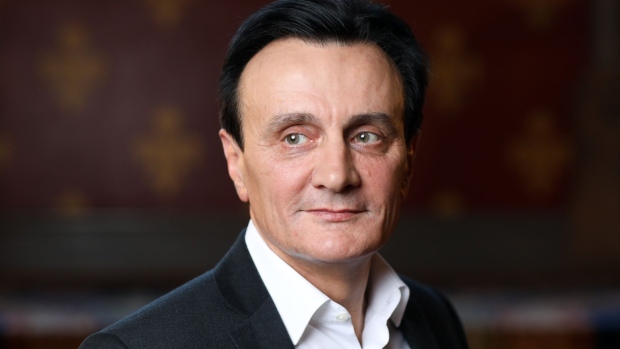Nov 5, 2020
AstraZeneca-Oxford COVID vaccine on track for year end, CEO says
, Bloomberg News

AstraZeneca Plc is poised to unveil coronavirus vaccine test results by year-end and begin supplying the world with hundreds of millions of doses shortly thereafter, Chief Executive Officer Pascal Soriot said, dismissing reports of delays and manufacturing snags.
Testing was a little delayed over the summer as infection rates slowed in the northern hemisphere but a recent resurgence has allowed scientists to gather the clinical data they need, Soriot said on a conference call. Astra is keeping the vaccine in a frozen bulk state for now to maximize its shelf life while it awaits final test results and regulatory clearances.
The U.K. drugmaker has been at the forefront of efforts to fight the pandemic, and its experimental shot under development with the University of Oxford could be one of the first to be approved globally if successful.
“At the end of the day, we don’t know if the vaccine works,” Soriot said in a Bloomberg TV interview. There are many questions remaining such as whether it works for everyone and for how long, and “hopefully those clinical trial results will enlighten us.”
Astra and drugmakers Pfizer Inc. and Moderna Inc. are all seeking to deliver crucial test results on a vaccine in the coming weeks, with emergency clearance possible before the end of the year.
Soriot said the world needs several vaccines and that Astra studies conducted in the U.K. and Brazil kept progressing well even as the U.S. one suffered a halt. It’s possible the U.S. Food and Drug Administration will want to wait for the results of the local trial before reviewing the product, he said.
Vaccine Timeline
The latest concern about Astra’s timeline came Wednesday after Kate Bingham, chair of the U.K. Vaccine Taskforce, said only 4 million doses of the Oxford-Astra shot would be available by the end of the year, far fewer than the 30 million that were due to be ready by September.
That shouldn’t be an issue because production will ramp up fast and “you don’t vaccinate 20 million, 30 million people in one country in one second, or even in a week,” Soriot said. “It takes time.”
Andrew Pollard, the chief trial investigator at Astra’s partner Oxford, said Wednesday there’s a “small chance” a vaccine could begin to be distributed by Christmas.
Astra has said it will sell the vaccine at cost during the pandemic at a price tag of between $4 to $5, depending on local manufacturing charges. The company said recently it would add as much as 20% to cover manufacturing costs to avoid any material impact on its finances. Astra is incurring a bill in excess of $1 billion globally for expenses including clinical development, Soriot said.
The AstraZeneca-Oxford candidate has produced a robust immune response in older adults and the elderly, those at highest risk of severe illness. Findings on blood tests carried out on a subset of older participants echo data released in July that showed the vaccine generated robust immune responses in healthy adults ages 18 to 55, Astra said last month.
Pandemic Disruption
Pfizer, which is developing its vaccine with Germany’s BioNTech SE, expects to release initial late-stage trial data this month and may apply for an emergency-use authorization in the U.S. shortly after. The U.S. company said at the end of October that its late-stage trial hadn’t yet reached a key milestone that will help researchers determine how well it protects people from COVID-19.
Astra on Thursday reported third-quarter profit that fell short of analysts’ estimates as the pandemic inflated costs and discouraged some doctors’ visits and diagnoses. Other drugmakers such as Switzerland’s Novartis AG and Denmark’s Novo Nordisk A/S also cited similar disruptions.
“Believe it or not, people are having heart attacks and they don’t go to the hospital because they are scared,” Soriot said on a conference call, also citing delays in cancer diagnoses and treatment. Injectable products are more affected by such slowdowns, he said.



